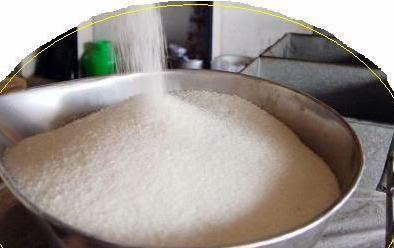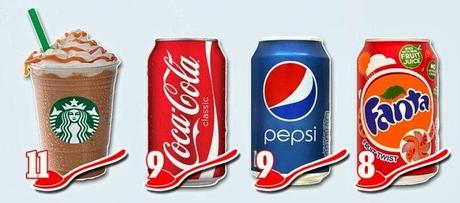 For most South Indians, day starts with a tumbler of ‘coffee’ – the concoction of coffee beans decoction, milk and …… sugar ~ ‘the sweet thing’. Human taste buds interpret its flavor as sweet. The type we usually mean - the white, powdery table-top version that we add to coffee and add to every dish that we make - is known as sucrose. Sugar as a basic food carbohydrate primarily comes from sugar cane. Sugar is a class of edible crystalline substances, mainly sucrose, lactose, and fructose. The English word "sugar" originates from the Arabic and Persian word shakar, and has its equivalent ‘sharkara’ in Sanskrit ~ it is ‘sakkarai’ in Tamil
For most South Indians, day starts with a tumbler of ‘coffee’ – the concoction of coffee beans decoction, milk and …… sugar ~ ‘the sweet thing’. Human taste buds interpret its flavor as sweet. The type we usually mean - the white, powdery table-top version that we add to coffee and add to every dish that we make - is known as sucrose. Sugar as a basic food carbohydrate primarily comes from sugar cane. Sugar is a class of edible crystalline substances, mainly sucrose, lactose, and fructose. The English word "sugar" originates from the Arabic and Persian word shakar, and has its equivalent ‘sharkara’ in Sanskrit ~ it is ‘sakkarai’ in TamilIt is ‘Diabetes mellitus’ or simply diabetes [colloquially sugar] - a metabolic disease in which a person has high blood sugar, either because the pancreas does not produce enough insulin, or because cells do not respond to the insulin that is produced. Blood glucose monitoring is a way of testing the concentration of glucose in the blood (glycemia). Particularly important in the care of diabetes mellitus, a bloodglucose test is performed by piercing the skin (typically, on the finger) to draw blood, then applying the blood to a chemically active disposable 'test-strip'. For some of those affected, it is a daily struggle ~ others too strive hard to keep things under control, for, uncontrolled blood sugar puts people at risk for a range of dangerous complications, some short-term and others longer term, including damage to the eyes, kidneys and heart. Managing diabetes is too important. Sugar is no sweet for them … it is dreaded killer to them, yet they struggle to contain the urge … that is too well known … what is not so, is the recent campaigns for lowering the consumption of sugar by others……………..
Sugar is consumed in so many forms as Sugar has become a readily accepted and at times almost unnoticed part of many everyday diets. Sugars occur in other plants and foodstuffs too - for example lactose in milk and fructose in fruit. The body can call on these compounds as quick-release fuel. If the energy isn't needed, it gets stored for later and is sometimes converted into fat. Over the centuries, sugar has been added to an increasing number of foods - from bread to salad dressings. Now health experts are crying that eating too many sugary drinks, desserts and sweets could increase your risk of having a heart attack. It has recently raised much dust and debate in UK.
A sugar tax may have to be introduced to curb obesity rates, the chief medical officer for England is quoted as saying. Dame Sally Davies told a committee of MPs that unless the government was strong with food and drink manufacturers, it was unlikely they would reformulate their products. She said she believed "research will find sugar is addictive", and that "they may need to introduce a sugar tax". Speaking to the health select committee, Dame Sally said: "We have a generation of children who, because they're overweight and their lack of activity, may well not live as long as my generation. "They will be the first generation that live less, and that is of great concern." Continuing on the need for curtailing obesity, she said researchers would find that sugars were addictive, and the public needed to have "a big education" over how "calorie packed" some smoothies, fruit juices and carbonated drinks were.
She is not alone …. the recommended sugar intake will stay at below 10% of total calorie intake a day, with 5% the target, says the WHO. The suggested limits apply to all sugars added to food, as well as sugar naturally present in honey, syrups, fruit juices and fruit concentrates. UK campaigners say it is a "tragedy" that the WHO has taken 10 years to think about changing its advice. The recommendation that sugar should account for no more than 10% of the calories in the diet, was passed in 2002. It works out at about 50g a day for an adult of normal weight, said the WHO.
The reports are abuzz with facts that most adults and children in the UK eat more sugar than is recommended as part of a healthy balanced diet; Food and drinks that have a lot of added sugar contain calories, but often have few other nutrients; Sugary foods and drinks can also cause tooth decay, especially eaten between meals; Sugar found naturally in whole fruit is less likely to cause tooth decay than juices or blends because the sugar is contained within the body of the fruit
Public Health Englandsaid its scientific advisory committee on nutrition was reviewing evidence on sugar in the UK diet stating that the UK population should reduce their sugar intake. The obesity study, published last year in the BMJ, found while sugar did not directly cause obesity, those who consumed a lot of it, particularly in sweetened drinks, tended to put on weight as sugary food did not make them feel full.

According to this report in Daily Mail published recently – the sugary drinks, energy drinks, meals and snacks contain up to double the safe amount of sugar that experts believe adults should consume per day. It states that according to researchers, a single Starbucks caramel frappuccino has 11 teaspoons of sugar and a can of Coca-Cola or Pepsi has nine teaspoons while the World Health Organisation recommended people should have no more than six teaspoons of sugar in 24 hours. Doctors say this rule is key to avoiding obesity, heart disease and other serious illnesses because they fear sugar is as dangerous as tobacco. It also revealed that many single products take up the new recommended allowance. For example a 51g Mars Bar has eight teaspoons, a can of Red Bull has seven, a Muller strawberry shortcake Crunch Corner has six teaspoons and so does an Innocent smoothie.
Perhaps the awareness campaign is new… the hazard is not …. It may take more years for us to have such researches and campaigns – till such time, it makes sense to follow global advice available, following it locally !
With regards – S. Sampathkumar.12th Mar 2014
Source : BBC and Dailymail.co.uk

